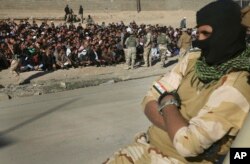A senior U.N. official said Monday that civilians in Mosul, Iraq, remained at risk of revenge attacks from Islamic State militants.
Lise Grande, deputy special representative of the U.N. Assistance Mission for Iraq, said that while the fighting in the former IS stronghold was over, the humanitarian crisis was not. The problems resulting from the nine-month fight in Mosul — the single largest urban battle since World War II — are enormous and difficult to handle, she said.
Grande said many IS fighters and sympathizers of the militant group, also known as ISIL, tried to blend in with civilians fleeing western Mosul in the final stages of the battle. She told VOA the Iraqi army had carefully screened civilians for arms, making the screening mandatory for the men.
She added, however, that another layer of security screening had been imposed following a spate of deadly suicide bombings carried out by women leaving Mosul.
"My understanding is that the security forces are deeply concerned that in the areas where ISIL still has capability, that, yes, they are very concerned about suicide bombers," Grande said. "In the case of Mosul right now, there have not been [bombings] for several weeks, but that does not mean that people are not worried about it."
Grande said another area of concern was revenge attacks by civilians and security forces against families associated with IS.
"For families who are outside of tribal protection mechanisms, you are really very, very, very vulnerable if you are alleged to have been associated with ISIL," she said. "This is why we are in discussions with the government for special protection measures for them."
For example, Grande said, voluntary camps could be established for those who choose to go, knowing that extra protection would be available. She said the Iraqi government was also considering other measures, with U.N. support, to try to stop this type of retaliation from occurring.





